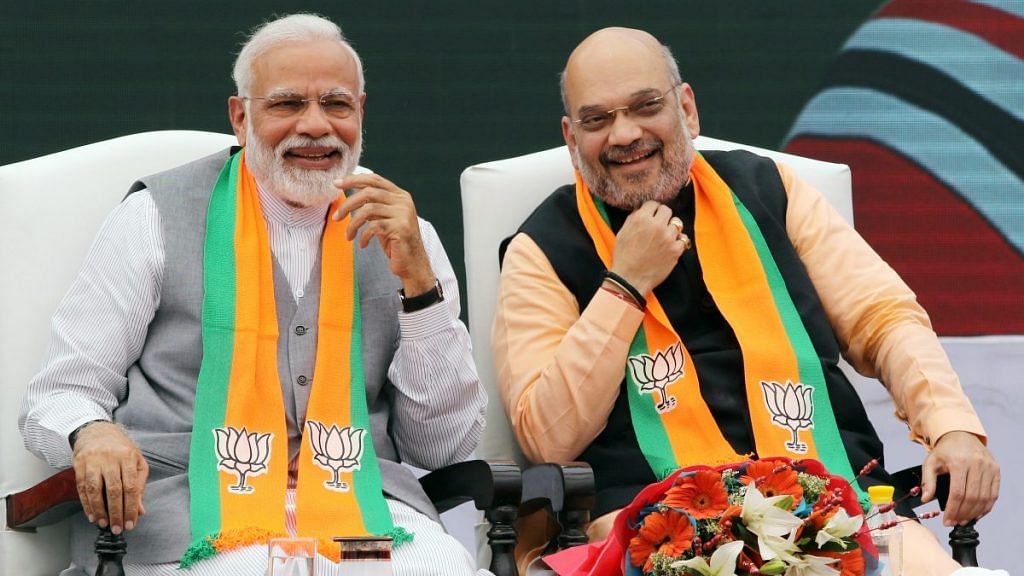There is something to be said about the month-long gap between Parliament passing the Citizenship (Amendment) Act in December, President Ramnath Kovind giving his assent and Amit Shah’s Home Ministry notifying it in January. And timing is everything in comedy and politics. Two things happened during this month – nationwide protests against the CAA and the Jawaharlal Nehru University violence. The protests in solidarity with JNU across several cities and Deepika Padukone’s presence on campus changed national headlines immediately. Five days after the JNU violence, the Narendra Modi government notified the CAA.
And the CAA went out of the headlines magically. This is why JNU is the graveyard of all anti-BJP protests. And the BJP has mastered the craft of bringing in JNU as a weapon of mass distraction when things get tough.
Is there a correlation between the events at JNU and the timing of the notification of the CAA? However, what we do know for sure is that the BJP under Narendra Modi loves to sail in the rough waters of JNU.
Also read: For headline-manager Amit Shah, JNU violence is a gift that distracts from CAA protests
Framing the ‘tukde tukde gang’
We have seen it earlier in 2016, when the BJP pounced on the opportunity created by a small section of ultra-Leftist fringe groups who organised a protest against the hanging of Afzal Guru. But for the RSS-supported ABVP, it would have gone unnoticed by even the JNU students.
But the JNU slogans came handy for the BJP at that time because the Modi government was facing nationwide protests against the death of Rohith Vemula. Thousands of angry Dalits were on the road and demanding the resignation of then HRD minister Smriti Irani. JNU ruckus was a godsend opportunity for the BJP to deflect the media attention from Rohith Vemula. When opposition leaders Rahul Gandhi and Sitaram Yechury also landed at JNU, it became easier for the BJP to brand the entire opposition as “tukde tukde gang”.
BJP made this a national issue. It also won the subsequent assembly election, three months later, in the state of Assam.
This smear campaign was so successful that even today any dissenting student from JNU is labelled an ‘Afzal Guru’ sympathiser and a member of the ‘tukde tukde gang’.
Also read: Why I didn’t call myself a JNU-ite for 37 yrs. But now something has changed: Yogendra Yadav
A part of the establishment
With hardly a few thousand scholars, JNU’s electoral impact is minuscule when compared to big campuses like Banaras Hindu University or Delhi University. Nevertheless, it is a vibrant campus known for its midnight debates at Ganga Dhaba and Godavari Lawns. All the issues missing from TV debates and snooty English dailies find place in JNU.
JNU will debate human rights of a convicted terrorist and how judiciary is anti-poor and still produce bureaucrats, ministers, academicians, NGO leaders and Nobel Prize winners. Hundreds of students burn their midnight oil to prepare for the UPSC, NET and IES and many more such exams. So much so, that students call the largest reading room of the JNU central library Dholpur House, after the name of the UPSC headquarters in New Delhi.
As a JNU-ite for just a few months, I can say, with my limited empirical data, that JNU has not produced a single ultra-Left leader who got killed in police action. JNU is not like Presidency College in Kolkata or Osmania University, or for that matter like BHU.
Year after year, JNU produces IAS, IPS, PCS officers and teachers. Even this year, in the IEC exam, JNU students bagged top positions.
Those JNU students who have opted for politics are also doing good. Nirmala Sitharaman, S. Jaishankar, Sitaram Yechury and Kanhaiya Kumar can vouch for that. The only exception was JNUSU president Chandrashekhar Prasad, who ventured into the bad lands of Bihar to lead a transformation and got killed by the goons of Mohammad Shahabuddin.
JNU is and has been actually an integral part of the establishment. The anti-establishment of the JNU seems anti-thesis to the establishment of the Indian state, but they both are part of a whole. Both of these, the Indian state and JNU, are bearer of specific values, but works in a system of mutual dependence.
Also read: Two reasons that can keep CAA-NRC protests from evolving into a larger anti-Modi movement
A handy rhetoric
This glory of JNU has been transformed into something of a stigma by the BJP. This is the narrative they stick to:
– Anti-nationals and radical Muslims find shelter in JNU
– These forces are supported by other anti-national forces – ultra-Leftists or the Naxals
– Opposition parties support such forces, especially the Congress and the Left
– The country has to be rescued from JNU
– Only the BJP and Modi-Amit Shah can save India from anti-national forces of JNU
This narrative has been normalised in public memory through constant rhetoric and vicious utterances by BJP leaders.
Whenever the BJP wants to deflect public attention from any inconvenient issue, it uses JNU as a handy tool.
The BJP has done it again to deflect from the CAA-NRC protests.
The author is the former managing editor of India Today Hindi magazine, and has authored books on media and sociology. Views are personal.
